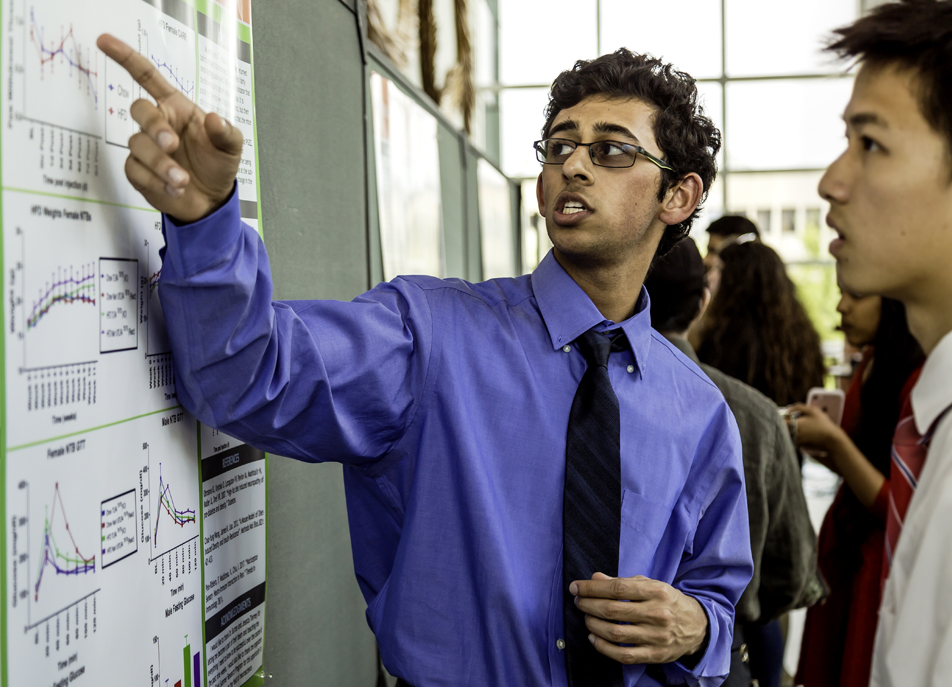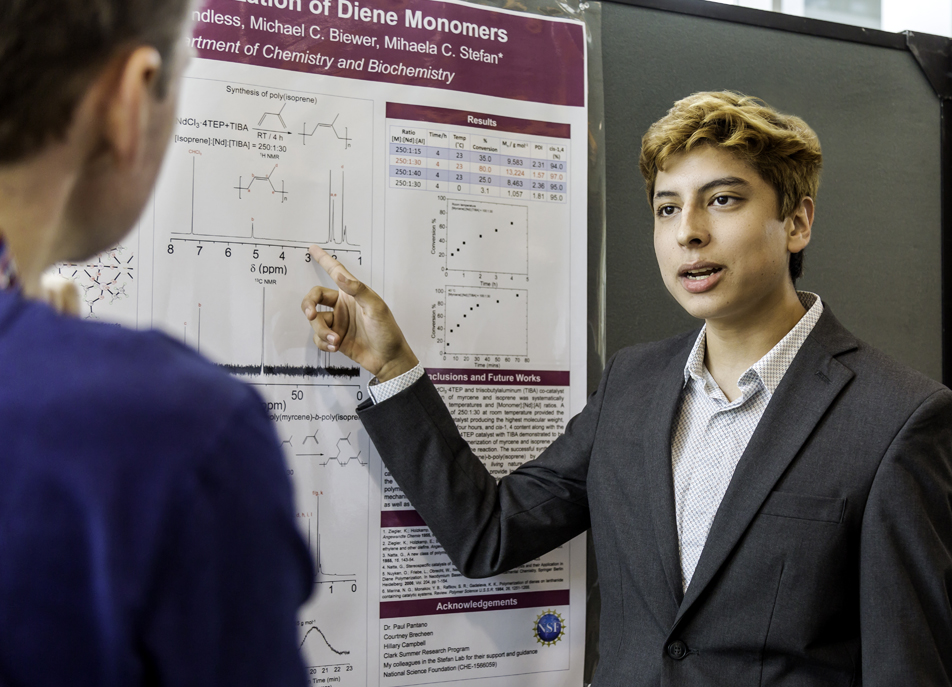Clark Scholars Program Yields Steady Flow of Ready Researchers
By: Office of Media Relations | Sept. 5, 2017
Karthik Hullahalli has seen this scene before — 26 incoming University of Texas at Dallas students displaying their summer work with the Anson L. Clark Summer Research Program.
Once, he was a new arrival in the Clark program — a graduate of Liberty High School in Frisco showing off his first collegiate project just before his initial semester as a biology student at UT Dallas. One year later, he was a peer advisor with the program, helping the next wave of “Clarkies” get a head start on their college careers.
Now, entering his senior year, Hullahalli can tell the new batch of scholars what’s ahead for them — and what a crucial advantage their first summer on campus can provide.
“One of the hardest things for someone who doesn’t start out in the Clark program is getting their foot in the door of a research lab,” Hullahalli said. “I stayed in the lab that I started with; many, but not all Clark Scholars, find their long-term home before classes start. Some people will figure out that they don’t like what they thought they wanted to do, and they’ll move on to other things.”
Clark Scholars spend nine summer weeks on campus conducting research with the program, coordinated by the Office of Undergraduate Education. The program, first conducted in 1968, concludes with a poster presentation and symposium.
Dr. Paul Pantano, an associate professor of chemistry who serves as the program’s scientific advisor, said one of the program’s strengths is its emphasis on exploring beyond a student’s comfort zone.
“We like having the computer scientists ask questions of the neuroscientists and we challenge the neuroscientists to make presentations that would be understood by computer scientists and vice versa.”
Dr. Paul Pantano,
associate professor of chemistry and scientific advisor for the Anson L. Clark Summer Research Program
“In addition to the research experience the Clark Scholars gain in their new labs, another value of the program is that scholars are exposed to research outside of their major fields of study,” Pantano said. “We like having the computer scientists ask questions of the neuroscientists, and we challenge the neuroscientists to make presentations that would be understood by computer scientists and vice versa.”
JoAnn Nguyen, a freshman from Plano East High School, presented her work on “Sculpting the Structure of CDASH,” which is a standardized method for collecting data. She spoke of the various benefits the Clark program provides its participants.
“This program was a really great opportunity for me to explore the labs,” Nguyen said. “I got to work in an environment that you’d usually only get in higher levels of colleges. And getting to meet professors in the summertime, you get to talk to them whenever you need to, and have real one-on-one conversations.”
Courtney Brecheen MPA'09, associate dean in the Office of Undergraduate Education, highlighted several important traits that the program nurtures, including teamwork, time management and communication.
“For many of these students, the Clark program is their first 40-hour-per-week work experience,” Brecheen said. “This leads to an accelerated maturation process that allows them to gain confidence about being independent and managing their time effectively. The students also enhance development of several soft skills — presentation skills, how to communicate professionally with mentors, and how to work effectively as members of diverse research groups.”
Dr. Michael Burton was among the 21 faculty mentors for this year’s program, who came from the School of Behavioral and Brain Sciences, the School of Natural Sciences and Mathematics, the Erik Jonsson School of Engineering and Computer Science, and the School of Arts, Technology, and Emerging Communication.
“These students get firsthand experience at what it’s like to be an undergraduate while they are in this transitional period — growing up, getting out of high school,” Burton said. “The Clark program provides a crucial step for many of them. There’s not a lot of downside to it.”
Incoming UT Dallas students who are recipients of Academic Excellence Scholarships can apply to be Clark Scholars. No previous research experience is required.
The Clark Summer Research Program is funded by an endowment from the Clark Foundation, whose philanthropy has supported scholarly endeavors at several Texas colleges and universities, such as the Anson L. Clark Memorial Lecture and the Dr. Anson L. Clark Presidential Scholarship at UT Dallas.












